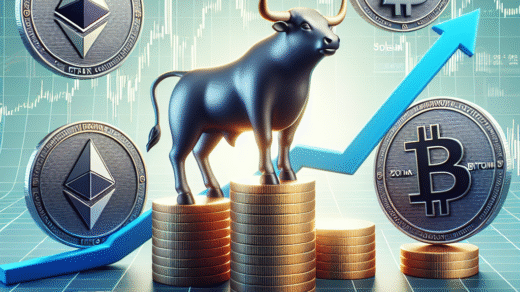“`html
Good Morning, Asia! Welcome to your essential update on cryptocurrency markets, with a focus on Bitcoin and the latest market dynamics. In this Asia Morning Briefing, we delve into the implications of Bitcoin’s recent price movements, the impact of ETFs on transaction fees, and how this affects miners.
Bitcoin Price Holds Steady Amid Low Transaction Fees
As Bitcoin’s price hovers near record levels, current on-chain activity tells a different story. According to data from Glassnode, transaction fees have plummeted to decade lows, even as Bitcoin (BTC) flirts with six-figure valuations. Historically, spikes in transaction fees would accompany bull markets as traders competed for block space. However, this year presents a stark contrast, with a flat fee curve as Bitcoin’s price rises, indicating that on-chain demand isn’t driving market movements like before.
Declining Fees: A Structural Shift in the Bitcoin Ecosystem
A recent report from Galaxy Research reveals that median daily fees have fallen over 80% since April 2024, with some daily blocks clearing at just 1 satoshi per vbyte. Nearly half of the recent blocks are not full, suggesting weak demand for block space and a stagnant mempool. This trend deviates significantly from previous bull cycles, where price rallies resulted in network congestion and increased fees. Now, with spot ETFs and custodians holding more than 1.3 million BTC, coins within these wrappers seldom interact with the blockchain again.
Moreover, retail activity that traditionally congested the Bitcoin blockchain has now shifted to platforms like Solana, where transactions involving memecoins and NFTs can be executed more rapidly and at a lower cost. Galaxy’s findings suggest that while Bitcoin’s price is increasingly influenced by custodial inflows, the network’s on-chain demand—once a barometer for price fluctuations—has notably diminished.
Miners Struggle as Profitability Declines
This evolving landscape poses significant challenges for Bitcoin miners. With the block reward halved to 3.125 BTC and fees contributing less than 1% of block revenue in July, many miners are facing profitability pressures. The stress of these conditions has prompted publicly listed miners to diversify their operations into artificial intelligence (AI) and high-performance computing (HPC) hosting.
A report earlier this year by Rittenhouse Research suggested that Galaxy Digital’s strategic exit from mining could serve as a blueprint for others in the sector. This strategic pivot has been well-received by equity markets, with the CoinShares Bitcoin Mining ETF gaining nearly 22%, despite Bitcoin itself being down over 3% year-to-date. Investors are increasingly favoring companies that diversify their business models rather than relying solely on block rewards.
The Importance of Diversification in Mining
Miners like Hive, Core Scientific, and TeraWulf have reported positive Q2 results boosted by revenues from HPC and AI hosting services. In contrast, companies like Bitdeer and BitFuFu, which have not diversified, remain acutely vulnerable to rising electricity costs, equipment depreciation, and a fee market that Galaxy warns is “anything but robust.” The juxtaposition is clear: while Galaxy’s research indicates stagnation in the Bitcoin blockchain’s settlement role, their balance sheet is being restructured to capitalize on growth in AI data centers.
On-Chain Data: The Future of Bitcoin Mining
On-chain data underscores the critical issue: without organic demand for block space, transaction fees cannot sustain network security. If fees continue to remain low, the equity markets are signaling that the most promising returns for the mining sector may soon come from AI ventures rather than Bitcoin itself.
Market Movements: Bitcoin and Beyond
As of the latest figures, Bitcoin is trading at approximately $113,286.95, reflecting a 1.79% decline after hitting a six-week low of around $110,600. The broader cryptocurrency market is currently experiencing heavy liquidations and increased volatility.
In other market highlights, Ether (ETH) remains stable at $4,779, buoyed by Jerome Powell’s dovish remarks from Jackson Hole, which have heightened expectations for a potential rate cut in September. Analysts are predicting new highs for Bitcoin and an ETH breakout above $5,000, despite ongoing risks from treasury adoption and market volatility.
Meanwhile, gold closed at $3,371, also benefiting from Powell’s comments that have improved sentiment around September rate cuts. In Asia-Pacific, stocks have risen, with Japan’s Nikkei 225 index up 1.08% following Powell’s indications of potential Fed rate cuts.
Elsewhere in the Crypto Space
Investment trends are evolving, and raising a crypto VC fund has become increasingly challenging, even amid a bullish market, as highlighted by The Block. Additionally, KPMG reports that investor interest in digital assets is expected to drive a robust second half for Canadian fintech firms.
For more insights into the cryptocurrency landscape and to stay updated with the latest market trends, check out our guides on how to buy cryptocurrencies and explore our analysis on Bitcoin ETFs.
“`
Meta Description: “Explore how Bitcoin ETFs are impacting transaction fees and miner profitability. Stay informed on market dynamics and Bitcoin’s performance in Asia’s crypto landscape.”







